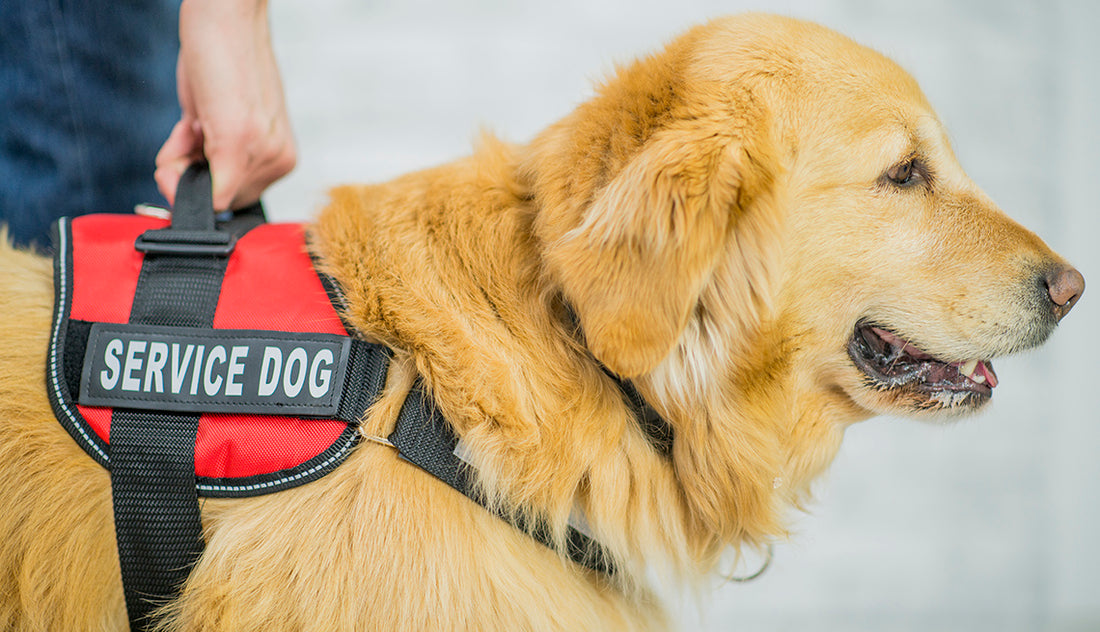Let's face it – all dogs bring joy, and a sense of calm to our lives. But when it comes to official designations, there’s a big difference between Emotional Support Animals (ESAs) and service dogs. Understanding these distinctions is essential, especially if you’re navigating public spaces and the legalities around them. Here’s the lowdown on what sets ESAs apart from service dogs, what businesses can (and can’t) ask you, and the scoop on where to get the service dog drip.
Emotional Support Animals (ESAs)
Definition and Purpose
ESAs can be of various species, offer emotional support to individuals grappling with mental / emotional health issues (most of us??). They don't need specific training – their mere presence is enough to alleviate stress and anxiety. (AMEN!)
Certification Process
Forget the bogus online certificates. To officially recognize your pet as an ESA, you need a letter from a licensed mental health professional. This letter is all you need, thanks to the Fair Housing Act (FHA).
Who Sees the ESA Letter?
The ESA letter isn’t for public display. You’ll need to present it to specific entities, such as:
- Landlords and Housing Authorities: To secure pet-friendly housing, even where there are no-pet policies.
- Airlines: Some airlines may still accept ESAs in the cabin, but policies have tightened, so check with the specific airline in advance.
- Educational Institutions: If you're living in a college dormitory, you may need to show it to your school.
Who Can't Ask for Your ESA Letter?
- Businesses: Regular businesses, like restaurants and stores, cannot demand to see your ESA letter because ESAs do not have the same public access rights as service dogs.
- Employers:Employers can’t ask for your ESA letter unless you are requesting a reasonable accommodation for a disability.
What Can Businesses Ask About Your ESA?
When it comes to ESAs, businesses have limited rights to inquire about your pet. Here’s what you need to know:
Public Spaces and Businesses
- General Public Access: Businesses such as restaurants, retail stores, and other public venues do not have to allow ESAs access. Since ESAs are not protected under the ADA for public access rights, businesses are not required to permit them entry, and thus they don’t need to ask any questions regarding your ESA.
Housing Providers
- Verification: Landlords and housing providers can ask to see your ESA letter to verify your need for the animal. They can request documentation from a licensed mental health professional that confirms your need for an ESA due to a mental or emotional disability.
- Reasonable Accommodation: While they can't charge pet fees or deposits for ESAs, they can require you to sign agreements concerning the care and behavior of the animal, and they can hold you responsible for any damages caused by the ESA.
Airlines
- Documentation: Airlines can require you to submit your ESA letter in advance, typically 48 hours before your flight. This letter must be from a licensed mental health professional and should detail your need for the ESA. Note that recent changes have allowed airlines to restrict ESAs in the cabin.
- Animal Behavior and Control: Airlines may also ask about the behavior and training of your ESA to ensure it can safely accompany you during the flight. They can deny boarding if the ESA displays aggressive or disruptive behavior.
Other Entities
- Educational Institutions: If you’re staying in college dormitories, schools may ask for your ESA letter to allow the animal to live with you. They typically follow similar protocols as housing providers.
Service Dogs
Definition and Purpose
Service dogs are the elite forces, trained to perform specific tasks for individuals with disabilities. Whether it’s guiding the visually impaired, alerting the hearing impaired, or picking up dropped items, these dogs are trained pros.
Certification Process
Service dogs undergo rigorous training. There’s no government-mandated certification, but credible organizations provide the necessary training and proof of capability.
Know Your Rights: What Businesses Can and Can’t Ask
Emotional Support Animals
ESAs have certain legal protections, but they don’t have the same public access rights as service dogs. Here’s what you need to know:
- Housing: Your landlord can’t deny you housing if you have an ESA, even if there's a no-pet policy.
- Travel: Some airlines may still allow ESAs to fly with their owners, but restrictions might apply.
Restrictions for ESAs
- Public Spaces: ESAs don’t have the same access rights as service dogs. They aren’t allowed in places like restaurants, stores, or other public venues.
- Airlines: While the Air Carrier Access Act previously provided accommodations, some airlines have tightened their ESA policies due to misuse. You might need to provide your ESA letter well in advance and comply with specific carrier rules.
- Housing: Landlords can’t charge extra fees for ESAs, but they can still hold you responsible for any damage caused by your pet.
- ESA's & Hotels: it's my experience in typical US hotels (Hilton, Marriott, etc) - if your dog is a typical ESA breed (i.e. golden retriever, doodle, labm etc..) with a service dog collar, the only thing a hotel will ask is "what service is your dog trained to provide." If you've trained your dog to do something specific for you that alleviates your emotional stress / condition - that is an acceptable answer.
Service Dogs
Under the ADA, service dogs have the red carpet rolled out for them in public spaces. Restaurants, stores, and hotels must welcome these canine helpers.
Public Access: Businesses can only ask:
1. Is the dog required due to a disability?
2. What task has the dog been trained to perform?
- Proof* No documentation or demonstration of tasks required. They can’t pry into your disability either.
Hotels and ESAs
Hotels are not required to allow Emotional Support Animals (ESAs) since ESAs do not have the same public access rights under the Americans with Disabilities Act (ADA) as service dogs. However, some hotels may have their own policies regarding ESAs and may choose to allow them. If a hotel does allow ESAs, they might require documentation such as an ESA letter from a licensed mental health professional.
For service dogs, hotels can ask the following two questions:
1. Is the dog required because of a disability?
2. What work or task has the dog been trained to perform?
The Amazon Factor: Gear Up in Style
Sure, it’s not mandatory, but decking out your ESA or service dog in gear from Amazon can make a statement. From collars to harnesses, there’s plenty of swag to choose from. Just remember, these accessories don’t replace the official documentation you might need.
Conclusion
ESAs and service dogs both play vital roles, but knowing the legal distinctions can save you a lot of headaches. Whether your dog is a comforting companion or a trained assistant, understanding your rights ensures smoother interactions in public spaces.
FAQs
1. Can an ESA go everywhere a service dog can
Nope, ESAs don’t get the same public access rights as service dogs.
2. Do I need special gear for my ESA?
Not required, but a letter from a licensed mental health professional is essential for housing and travel.
3. Can businesses ask for my service dog’s credentials?
Absolutely not. They can only ask if it’s a service dog and what tasks it performs.
4. Is online ESA certification legit?
Be wary. Your ESA letter must come from a licensed mental health professional.
5. Where to buy ESA or service dog gear?
Amazon’s got you covered with a range of stylish and functional accessories.







